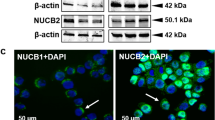Abstract
AN understanding of growth control in animal cells requires an appreciation not only of cellular events important to multiplication, but also of exogenous agents which either initiate or influence the ‘decisions’ of a cell to reproduce. Serum has been reported to contain factors required for cell movement1, viability2, ion transport3 and control of cell density4. In addition, peptides from tissue or plasma have been identified (nerve growth factor (NGF)5, somatomedin6, non-suppressible insulin-like activity (NSILA)7, multiplication-stimulating activity (MSA)8, epidermal growth factor9, fibroblast growth factor10) which seem to have a physiological role in the initiation of cell proliferation. Somatomedin, NSILA and MSA are probably similar, if not identical, substances and, like NGF, seem to be structurally related to insulin11–13. The ability of insulin to initiate DNA synthesis in various cells14–17 may be due to cross reactivity of the hormone with receptor sites concerned with cell multiplication12. Recent reports suggest that serum contains additional substances that can influence the ability of a cell to respond to agents which initiate DNA synthesis10,18,19. While investigating the regulatory roles of insulin and serum in the initiation of DNA synthesis in quiescent chick embryo fibroblasts (CEF), we have found a distinctive difference in the initiation capacity of these agents after the inhibition of protein synthesis. We present here evidence for the existence of a regulatory component(s) in serum which recruits cells for growth from a stage in the cell cycle position (G0?) which is refractory to mitogenic peptides.
This is a preview of subscription content, access via your institution
Access options
Subscribe to this journal
Receive 51 print issues and online access
$199.00 per year
only $3.90 per issue
Buy this article
- Purchase on Springer Link
- Instant access to full article PDF
Prices may be subject to local taxes which are calculated during checkout
Similar content being viewed by others
References
Lipton, A., Klinger, I., Paul, D., and Holley, R. W., Proc. natn. Acad. Sci. U.S.A., 68, 2799–2801 (1971).
Paul, D., Lipton, A., and Klinger, I., Proc. natn. Acad. Sci. U.S.A., 68, 645–648 (1971).
Cunningham, D. D., and Pardee, A. B., Proc. natn. Acad. Sci. U.S.A., 64, 1049–1056 (1969).
Holley, R. W., in Control of Proliferation in Animal Cells. (edit. by Clarkson, B., and Baserga R.) 13–18 (Cold Spring Harbor Laboratory, New York, 1974).
Levi-Montalcini, R., and Angeletti, P., Physiol. Rev., 48, 534–569 (1968).
Van Wyk, J. J., and Underwood, L. E., A. Rev. Med., 26, 427–442 (1975).
Morrell, B., and Froesch, E. R., Eur. clin. Invest., 3, 119–123 (1973).
Dulak, N. C., and Temin, H. M., J. cell. Physiol., 81, 153–160 (1973).
Cohen, S., and Taylor, J. M., Rec. Prog. Hormone Res., 30, 533–550 (1974).
Gospodarowicz, D., Nature, 249, 123–127 (1974).
Frazier, W. A., Angeletti, R., and Bradshaw, R. A., Science, 176, 482–487 (1972).
Van Wyk, J. J., et al., Adv. metabolic Dis., 8, 128–150 (1975).
Rechler, M. M., and Podskalny, J. M., Nature, 259, 134–136 (1976).
Temin, H. M., J. cell. Physiol., 69, 377–384 (1967).
Lockwood, D. H., Voytovich, A. E., Stockdale, F. E., and Topper, Y. J., Proc. natn. Acad. Sci. U.S.A., 58, 658–664 (1967).
Griffiths, J. B., Expl Cell Res., 75, 47–56 (1972).
Paul, D., and Walter, S., J. cell. Physiol., 85, 113–124 (1975).
Leffert, H. K., J. Cell Biol., 62, 767–779 (1974).
Nadal, C., and Boffa, G. A., Cell Tissue Kinet., 8, 297–305 (1975).
Baseman, J. B., and Hayes, N. S., J. Cell Biol., 67, 492–498 (1975).
Vaheri, A., Ruoslahti, E., Hovi, T., and Nordling, S., J. cell. Physiol., 81, 355–364 (1973).
Temin, H., J. cell. Physiol., 78, 161–170 (1971).
Rubin, H., Virology, 4, 533–562 (1957).
Willis, M. V., Baseman, J. B., and Amos, H., Cell, 3, 179–184 (1974).
Burton, K., Methods in Enzymology, 12, 163–166 (1968).
Brownstein, B., Rozengurt, E., Jimenez, De Asua, L., and Stoker, M., J. cell. Physiol., 85, 579–585 (1975).
Baseman, J. B., Paolini, D., and Amos, H., J. Cell Biol., 60, 54–64 (1974).
Boynton, A. L., Whitfield, J. F., and Isaacs, R. J., In Vitro, 12, 120–123 (1976).
Author information
Authors and Affiliations
Rights and permissions
About this article
Cite this article
GROELKE, J., BASEMAN, J. Serum can initiate DNA synthesis in cells rendered unresponsive to insulin and somatomedin. Nature 263, 140–142 (1976). https://doi.org/10.1038/263140a0
Received:
Accepted:
Issue Date:
DOI: https://doi.org/10.1038/263140a0
Comments
By submitting a comment you agree to abide by our Terms and Community Guidelines. If you find something abusive or that does not comply with our terms or guidelines please flag it as inappropriate.



